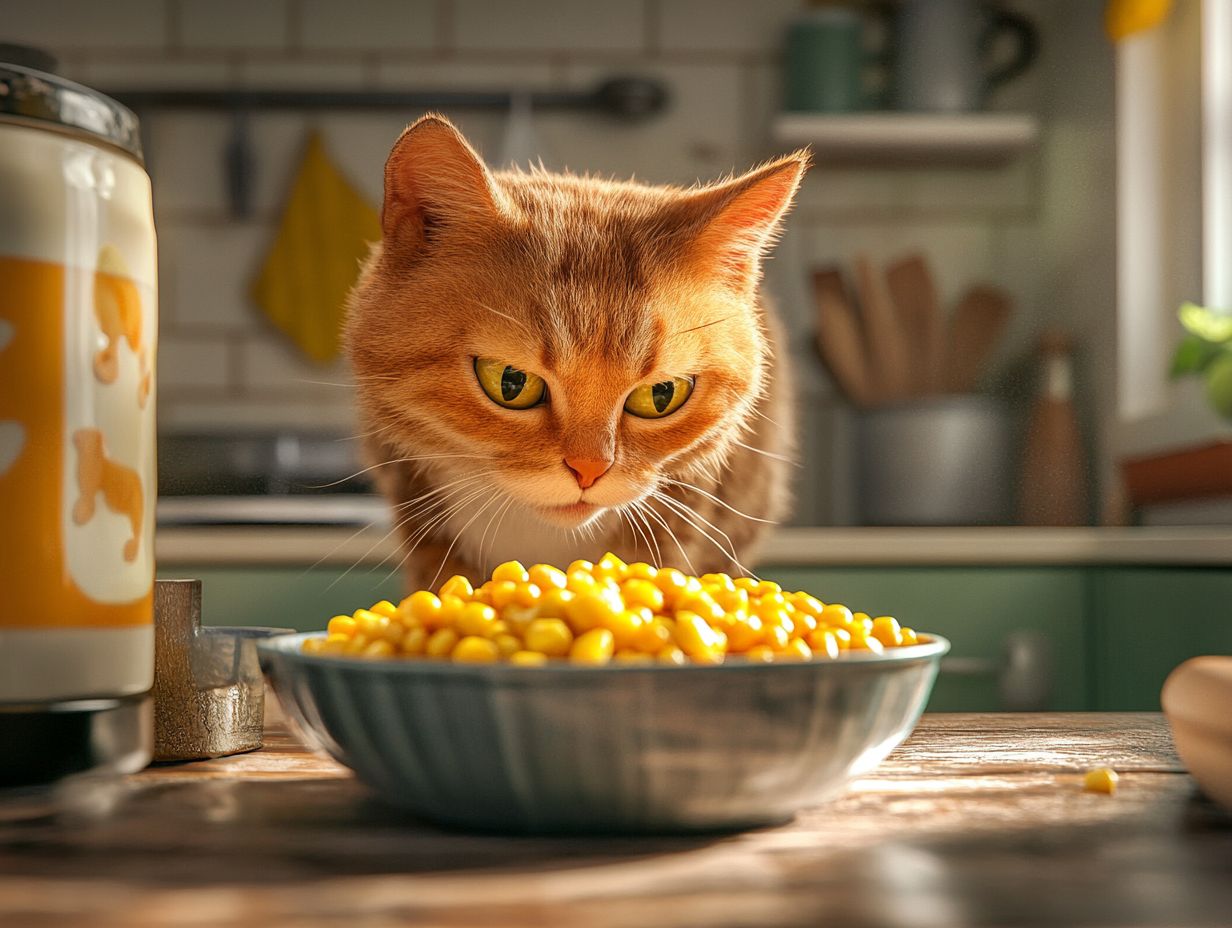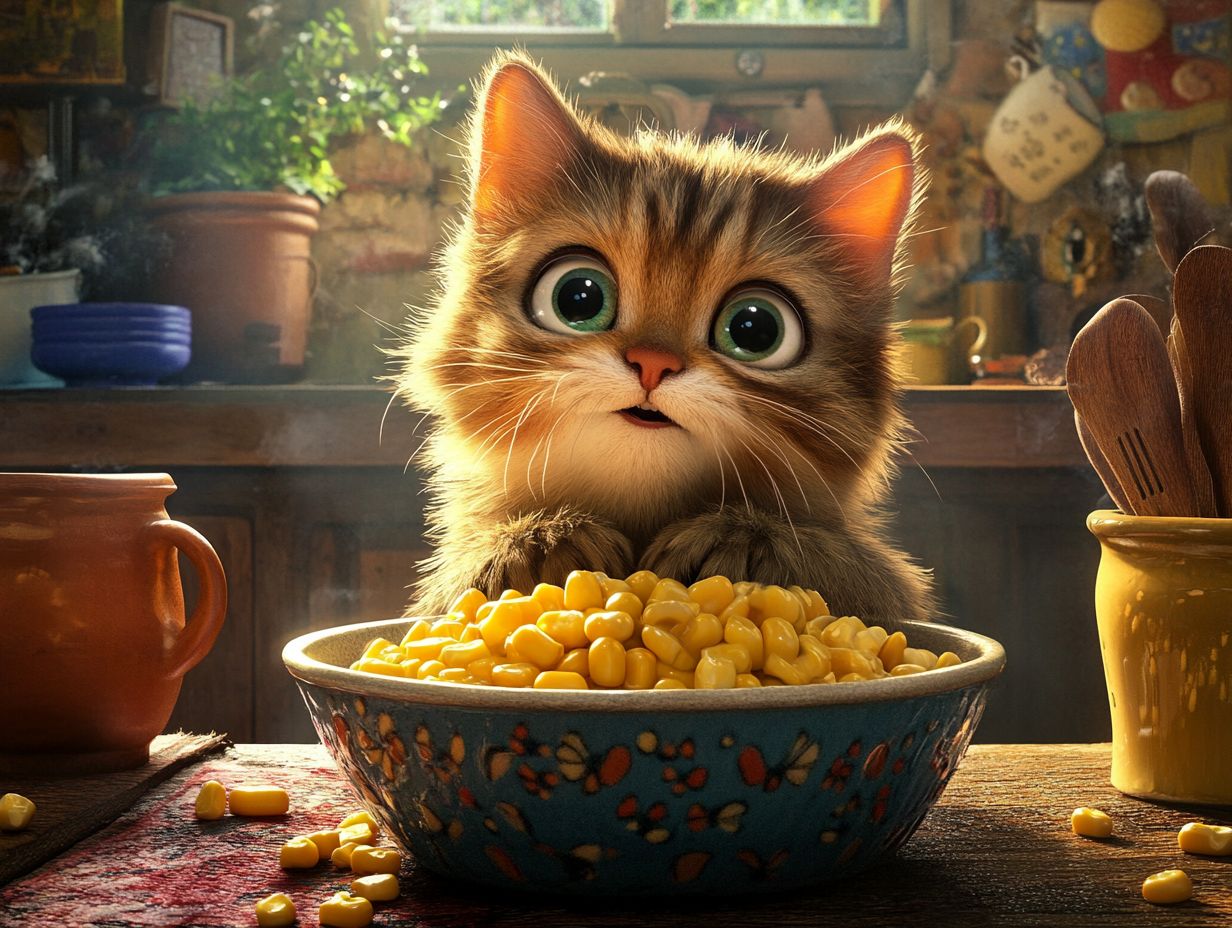Are corn and popcorn safe for your cat? As a cat owner, you might wonder if sharing your favorite snacks with your feline friend is safe—especially when it comes to foods like corn, sweet corn, popcorn, and even corn dogs.
While it’s a common ingredient in many cat foods, there’s still some debate about its suitability for our furry companions. This piece explores the details of a cat’s digestive system, potential risks such as gastrointestinal issues and diabetes, benefits like nutritional value, and healthier alternatives.
If you choose to feed your cat corn, limit the portion to a small tablespoon to avoid digestive upset. Additionally, we will provide tips on how to safely incorporate corn into their diet.
Join us as we navigate this topic to ensure your cat’s health and happiness.
Key Takeaways:

- Corn is generally safe for cats to eat, but their digestive system is not built to process it efficiently.
- Feeding corn to cats can potentially lead to health issues such as vomiting, diarrhea, and allergies.
- There are better alternatives available that provide more nutritional benefits for your cat’s health.
Is Corn Safe for Cats?
Corn is safe for cats when given in moderation, but it’s essential to evaluate its nutritional benefits and risks. Cats primarily derive their nutrition from animal proteins, but can occasionally consume plant-based foods, including corn and its various forms, such as sweet corn.
Understanding a Cat’s Digestive System
A cat’s digestive system is designed for a high-protein diet. While some carbohydrates can be digested, excessive amounts can lead to issues like obesity or diabetes. The anatomy of a cat’s digestive tract facilitates rapid breakdown and absorption of proteins, making it crucial to limit carbohydrate intake.
Benefits and Risks of Corn for Cats
While corn contains vitamins such as Vitamin A and B, alongside minerals like magnesium, it should only be an occasional treat. Overconsumption can lead to digestive issues and allergic reactions in some cats. Monitor your cat for symptoms such as:
- Vomiting
- Diarrhea
- Excessive grooming
- Skin irritations
Approximately 10-15% of cats suffer from food allergies, with corn being one of the common triggers. If you notice these symptoms, consult your veterinarian.
How to Safely Incorporate Corn into Your Cat’s Diet
Cats can safely consume corn if prepared properly and given in small amounts. Start with 1 teaspoon of cooked corn per 5 pounds of body weight, once a week. Always ensure it is fully cooked and free from added salt, butter, or spices.
Recommended Portions
When feeding corn to cats, it is essential to serve small portions. Larger amounts might be acceptable but should be approached with caution to avoid digestive upset.
Alternatives to Corn for Cat Nutrition
Consider high-protein options such as chicken, tuna, beef, and salmon as healthier alternatives. Always read labels and choose foods with animal protein as the main ingredient.
Final Considerations for Cat Owners
Every cat is unique, and while corn can be an occasional treat, always consult with your veterinarian. Monitor your cat for any reactions to new foods, especially corn, and keep an eye out for symptoms like vomiting or changes in appetite.
Frequently Asked Questions

Can cats eat corn?
Yes, but only in moderation as an occasional treat. Too much corn can lead to digestive issues and lacks essential nutrients.
Is corn safe for cats to eat?
Corn is generally safe, but avoid processed varieties containing additives.
What are the benefits of feeding corn?
Corn provides carbohydrates, but focus on high-protein foods for better nutrition.
Can corn be harmful to cats?
Excessive corn can cause digestive issues and potential blockages from corn husks.
How should corn be prepared for cats?
Always serve cooked or canned corn in small portions to ensure digestibility.
Are there healthier alternatives to corn?
Consider vegetables like green beans and peas, or protein-rich foods instead.
Common symptoms of corn allergies in cats
Watch for itching, swelling, digestive upset, or behavioral changes if your cat is sensitive to corn.
Guidelines for Safe Feeding
Introduce corn gradually, monitor for reactions, and consult your vet for tailored advice.
Conclusion
In summary, corn can be an occasional treat for cats, but always prioritize consulting with a veterinarian for safe dietary practices.